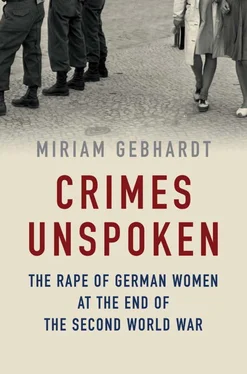All of the following cases: Landesarchiv Berlin, Neukölln Department of Health, affidavits, Rep. 214 no. 94.
BayHStaA MInn 81091 6726 – Processing of child maintenance claims against members of foreign armed forces 1958–60.
BayHStaA MInn 81091 – Report of juvenile departments in 1953, supplement to 6726.
Of 100 white and half-caste illegitimate occupation children in Bavaria, in 1954 70 and 61, respectively, lived with their mothers, 16 and 10 with relatives, 9 and 14 with distant relatives, and 5 and 15 in homes. Thus 95 per cent and 85 per cent respectively lived with close relatives. The records explicitly point out that the placement of half-caste children in foster families ‘in general did not meet with the resistance that had originally been feared’: BayHStA MInn 81094, supp. no. 3 to 67261.
BA Koblenz B 153/342.
Ibid.
Bavarian State Ministry of Justice on 23 April 1956 to the Federal Minister of Justice, BayHStA MInn 81087.
Satjukow, ‘Besatzungskinder’, p. 11.
Ibid., p. 14.
See Naimark, The Russians and Germans , p. 205.
G. and E. v. H. in a letter to the Petition Committee of the German Bundestag on 24 February 1958, BA Koblenz B/126/5548.
BA Koblenz B/126/5548, Applications to the Federal Ministry of Finance to grant compensation for rapes before 1 August and outside the federal territory; letter of 5 March 1951.
BA Koblenz B/126/5548, Application to the Federal Ministry of the Interior of 12 June 1951, maintenance for children resulting from rape by the enemy.
BA Koblenz B/126/5548, letter of 27 April 1951.
SPD press service, August 1856. Nadig was a member of the Committee for the British Occupation Zone. She was appointed to the Parliamentary Council in 1948 and worked on the Basic Law. She was one of the women responsible for Article 3 (Equality before the law) and she fought, albeit without success, for equal pay for men and women for equal work and for equality before the law for illegitimate children.
To the Petition Committee of the German Bundestag, 27 July 1956, Occupation Damage, application by Paul Skriewe, Heroldsberg bei Nürnberg of 22 November 1955, BHStaA MInn 81085.
BayHStA MInn, 81085, suppl. no. 1 to 6726.
BayHStA MInn 81085.
BA Koblenz B 126/28038, Berlin Senator for Finance, 28 March 1957.
Federal Ministry of the Interior to Federal Ministry of Finance of 28 August 1956; BA Koblenz B 126/28038.
Letter from the Federal Ministry of the Interior on 5 July 1960.
BayHStA MInn 81086, 26 March 1954, Federal Minister of the Interior to the Bavarian State Ministry.
BayHSta MInn 81086.
Ibid.
See Bernd Serger, Karin-Anne Böttcher and Gerd R. Ueberschär (eds.), Südbaden unter Hakenkreuz und Trikolore: Zeitzeugen berichten über das Kriegsende und die französische Besetzung 1945 (Freiburg 2006).
BA Koblenz 153/342, Statistisches Landesamt Baden-Württemberg, census of illegitimate occupation children of 30 May 1955.
Quoted in Edgar Wolfrum, ‘Das Bild der “düsteren Franzosenzeit”: Alltagsnot, Meinungsklima und Demokratisierungspolitik in der französischen Besatzungszone nach 1945’, in: Stefan Martens (ed.), Vom ‘Erbfeind’ zum ‘Erneuerer’: Aspekte und Motive der französischen Deutschlandpolitik nach dem Zweiten Weltkrieg (suppl. to Francia 27, edited by Deutsches Historisches Institut Paris) (Sigmaringen 1993), pp. 87–113.
Marc Hillel, L’occupation française en Allemagne, 1945–49 (Saint-Armand-Montrand 1983), pp. 83, 108–11, quoted in Perry Biddiscombe, ‘Dangerous Liaisons: The Anti-Fraternization Movement in the US Occupation Zones of Germany and Austria, 1945–1948’, in: Journal of Social History 34, 3 (2001), p. 635.
Serger et al., Südbaden unter Hakenkreuz , p. 311.
Schwendemann, ‘Das Kriegsende in Ostpreussen’, p. 105.
Quoted in ibid., p. 106.
In view of the fact that some of the villages and hamlets are very small, I have changed the initials of the victims. The following cases come from the Landesarchiv Baden-Württemberg / Staatsarchiv Freiburg, Bestand D 5/1 Einzelfälle.
Staatsarchiv Freiburg, compensation court, individual cases; letters from welfare worker of 12 December 1948, 17 April 1951, D 5/1 5295.
Ibid., D 5/1 5387.
Ibid., D 5/1 5606.
Ibid., D 5/1 5228.
Ibid.
Ibid., D 5/1 5421.
Ibid., D 5/1 5408.
Ibid., D 5/1 5517.
Ibid., D 5/1 4925.
BA Koblenz B/126/28038.
H. R. to the Federal Minister of Finance on 14 January 1959, BA Koblenz.
I. D. on 19 July 1957 to the Federal Minister of Finance, BA Koblenz B/126/5548.
H. S. on 25 July 1959 to the Federal Chancellor, BA Koblenz B/126/5548.
Letter to Federal Minister for Family Affairs Franz-Josef Wuermeling, BA Koblenz B/126/5548.
Satjukow, ‘Besatzungskinder’, p. 10.
To Federal President Heuss, BA Koblenz 28 November 1957, BA Koblenz B/126/5548.
Staatsarchiv Freiburg, compensation court, individual cases, D 5/1 5047.
Ibid., D 5/1 5325.
Ibid., D 5/1 5312.
Eva Ebner, assistant director, who worked with Fritz Lang and Rainer Werner Fassbinder, was born in 1922 in Danzig/Gdansk to a Jewish mother. At the end of the war she fled and hid in a portside barracks, where she was found by Red Army soldiers and raped for over two hours. She passed up the opportunity to identify the perpetrators in a line-up and have them punished, which in retrospect she realized was the best thing she had done in her life because in doing so she had prevented further senseless killing (Hildebrandt and Kuballa (eds.), Mein Kriegsende , pp. 31–2).
Staatsarchiv Frankfurt, compensation court, individual cases, D 5/1 3889.
This comment was made during a discussion with Wolf Jobst Siedler and Martin Walser in Die Zeit entitled: ‘Können wir uns einen Ilja Ehrenburg leisten?’, quoted in Tischler, ‘Die Vereinfachungen des Genossen Ehrenburg’, pp. 326–39.
Читать дальше











